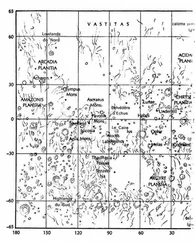One time near dusk Loon was sent back out to get more frozen fish from the platform. He was allowed to go by himself now, because there was no reason not to. He wasn’t going anywhere. He knew the jende had seen this in him, and it gave him a little pleasure to contemplate it as an artifact, like one of his carved sticks, or the wall paintings back home, still so clear in his eye if he thought about them. Sometimes he thought about them on purpose, to get away from the jende at moments when they might be inspecting him. Red bear, black bison.
And so when they sent him out alone to fetch something, or take a meal’s refuse out to the midden down the hill, in a snow mound that in summer would melt, carrying all the refuse into the river and out to the great salt sea, he continued to try to take something useful from the house and hide it in his marmot tuck in the boulder field under the hill east of camp. There were twentytwenty boulders at the foot of this hill, and the biggest had rolled farthest. In this great shatter no one would find his tuck.
His runs to his boulder and stashing of stolen things, followed by his return to camp, not to mention the completion of whatever chore he had been sent out to do, all happened so fast, with his heart beating so hard, that only in these moments was he awake as of old. These times felt so rushed and strange that leaving the house became like jumping into a dream.
Then back into the warmth of the big house, breathing slowly and with care, each breath crafted to show a calm spirit. And in fact the breathing helped make it so. Asleep on his feet, just another cold captive.
One time he was sent out with the night bucket to empty it down at the shitting field, another snow-covered space that would melt out of their world come the thaw, and he saw Elga coming back from the same destination, an empty bucket in her hand.
They stopped in their tracks, looked around. They were alone. Loon approached her, his free hand extended.
—We can’t let them see that I know you, Elga reminded him sharply.—They’ll kill you.
—I know. I’m still looking for our moment. Be ready.
—We’ll need snowshoes, she said.
Loon felt his chest expand with a huge in-breath.—So you want to go?
—Yes! she said fiercely. He saw it was true and his throat clamped.
—No more now, she said.—They’ll come looking for me soon. I’m only supposed to go out with others.
Loon nodded.—Be ready. And with a light touch to the arm he passed her and went down to the shitting ground.
Late spring: snow still covered the world, but it was melting everywhere, suncupped everywhere. On some south-facing slopes the suncups were waist deep. In the mornings, when they were frozen hard, it was like walking across upturned blades of rock, and seemed dangerous. Later in the day one could step on the blade edge of a suncup and smash it down just right for walking on it. Later still the snow became so soft and sloppy that it disintegrated underfoot in ways that skidded the walker this way or that, mostly crashing down into the holes of suncups, where sometimes step-throughs took you down right to the hip. Badleg took some horrible blows that way. It was remarkable how in just a fist or two the snow could go from a white rock to a watery mush. After dark it hardened back up fairly quickly also. It was not as fast as air, but fast.
All this time the jende had their platforms of frozen fish and sealskin bags. They had so much fat that they could use it as firewood. And the days were getting longer. Soon the break-up would come, and the earth reappear from under the snows. Summer would be on them.
One night the wind came strong from the west, and in the morning it was blowing so hard that the roar of it was loud even in the big house. Outside the entry tunnel, even the old spring snow was flying east over the ground. They had to block off the entryway to keep air from flying up into the house and blowing it apart like a popped seaweed bladder. Loon went outside with the men dealing with that, and as they put together a door of poles and hides to cover the entryway they were frequently knocked over by strong gusts, after which the wind sometimes had them sliding like seals over ice. They all laughed, shocked to feel just how strong the wind could be.
Later in the day, when the wind had died down a bit, the same men went back out to see if everything was all right around the camp, and also just to be out in such an extraordinary blow. After making sure camp was secure, they pushed down into the wind to the edge of the great salt sea. The sea ice was gone without a trace; they watched wild broken white waves roar in and surge in a boil up onto the snowy strand, there to launch foam streamers that rolled inland until they snagged on rocks or tufts of grass and were blown to nothingness. All of that was astonishingly loud; they could barely hear each other even when shouting in each other’s faces. Some gusts were so strong that they had to sit down with their backs to the wind, and even then were scooted over the sand by the heaviest buffets. They couldn’t stop laughing.
In the midst of this, one pointed out at something in the waves, and some of the others stood and leaned into the wind to look, their arms outstretched like birds gliding, or holding their parkas onto their heads. Out in the broken waves floated one of the gigantic tree trunks they used as house posts and markers by the shore. Some of their older standing posts had fallen down in this day’s wind, but most withstood it as they had so many previous gales, and held their position without even quivering.
Now a new log was floating in sideways on the white-capped rollers, then crashing onto the beach, where it was nudged and sloshed farther with every big surge, until it lay there like the dead body it was, corpse of a tree bigger than any Loon had ever seen. He wondered what kind of land could be on the far side of the great salt sea, to grow such trees.
Later, when the wind had died, all the jende men and many of the women went out and grabbed ropes they had tied to the new driftwood log, and together they pulled it onto a collection of smoothed branches placed crossways. They pulled the log easier over these branches, and picked up the branches from behind it when they emerged, and moved them to the front. This reduced the pull needed to move it by a great deal. They hauled the log to the line of standing trunks at the back of the strand, and after digging a hole, hauled the broken end into it, and when it tipped in, pulled on the root end with ropes until the log was standing upright among the rest of them at the back at the beach, there to defy the west wind until it too fell down, or was hauled off for use in camp.
One night when the jende were boiling fish in buckets using rocks heated in the fire, and the upper levels of the house were at their hottest, two figures draped in furs leaped up out of the cold trap and stuck people with spears and threw fat on the fire, causing it to splash blazing all over the room. In the screaming and smoke and confusion one of the invaders took up the bucket of boiling water and threw it in all their faces and then onto the blazing fat fire, after which fire ran everywhere. Like otters in a beaver’s house the invaders stuck anyone they passed while dropping back to the ground floor. One of them grabbed Loon by the arm; only then did he see it was Thorn. Beside him the old one Heather had nursed to health was shrieking like a lynx, teeth bared; the inhuman howl cut through the jende’s screams and made the assault even more stunning.
Loon snatched his boots as Thorn hauled him down into the cold trap. They ran out the entry tunnel and Thorn tossed a burning brand back onto an opened bag of fat he had spilled behind him. Soon the whole entryway blazed.
Читать дальше











